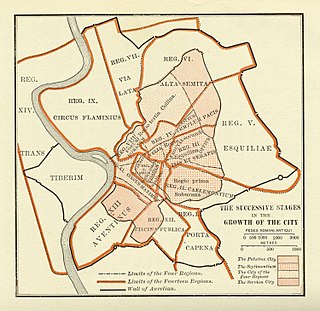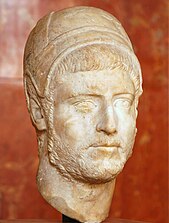
The Roman Kingdom, also referred to as the Roman monarchy or the regal period of ancient Rome, was the earliest period of Roman history when the city and its territory were ruled by kings. According to tradition, the Roman Kingdom began with the city's founding c. 753 BC, with settlements around the Palatine Hill along the river Tiber in central Italy, and ended with the overthrow of the kings and the establishment of the Republic c. 509 BC.

Jupiter, also known as Jove, is the god of the sky and thunder, and king of the gods in ancient Roman religion and mythology. Jupiter was the chief deity of Roman state religion throughout the Republican and Imperial eras, until Christianity became the dominant religion of the Empire. In Roman mythology, he negotiates with Numa Pompilius, the second king of Rome, to establish principles of Roman religion such as offering, or sacrifice.

In ancient Roman religion and mythology, Liber, also known as Liber Pater, was a god of viticulture and wine, male fertility and freedom. He was a patron deity of Rome's plebeians and was part of their Aventine Triad. His festival of Liberalia became associated with free speech and the rights attached to coming of age. His cult and functions were increasingly associated with Romanised forms of the Greek Dionysus/Bacchus, whose mythology he came to share.

Numa Pompilius was the legendary second king of Rome, succeeding Romulus after a one-year interregnum. He was of Sabine origin, and many of Rome's most important religious and political institutions are attributed to him, such as the Roman calendar, Vestal Virgins, the cult of Mars, the cult of Jupiter, the cult of Romulus, and the office of pontifex maximus.

In Roman mythology and religion, Quirinus is an early god of the Roman state. In Augustan Rome, Quirinus was also an epithet of Janus, as Janus Quirinus.

In ancient Roman religion and myth, Janus is the god of beginnings, gates, transitions, time, duality, doorways, passages, frames, and endings. He is usually depicted as having two faces. The month of January is named for Janus (Ianuarius). According to ancient Roman farmers' almanacs, Juno was mistaken as the tutelary deity of the month of January, but Juno is the tutelary deity of the month of June.

Religion in ancient Rome consisted of varying imperial and provincial religious practices, which were followed both by the people of Rome as well as those who were brought under its rule.

The Archaic Triad is a hypothetical divine triad, consisting of the three allegedly original deities worshipped on the Capitoline Hill in Rome: Jupiter, Mars and Quirinus. This structure was no longer clearly detectable in later times, and only traces of it have been identified from various literary sources and other testimonies. Many scholars dispute the validity of this identification.
Si deus si dea is an Archaic Latin phrase meaning "whether god or goddess". It was used to address a deity of unknown gender. It was also written sive deus sive dea, sei deus sei dea, or sive mas sive femina.

Romulus was the legendary founder and first king of Rome. Various traditions attribute the establishment of many of Rome's oldest legal, political, religious, and social institutions to Romulus and his contemporaries. Although many of these traditions incorporate elements of folklore, and it is not clear to what extent a historical figure underlies the mythical Romulus, the events and institutions ascribed to him were central to the myths surrounding Rome's origins and cultural traditions.

In ancient Roman religion and mythology, Mars is the god of war and also an agricultural guardian, a combination characteristic of early Rome. He is the son of Jupiter and Juno, and was pre-eminent among the Roman army's military gods. Most of his festivals were held in March, the month named for him, and in October, the months which traditionally began and ended the season for both military campaigning and farming.
Lucius Cincius Alimentus was a celebrated Roman annalist, jurist, and provincial official. He is principally remembered as one of the founders of Roman historiography, although his Annals has been lost and is only known from fragments in other works.

Alba Longa was an ancient Latin city in Central Italy in the vicinity of Lake Albano in the Alban Hills. The ancient Romans believed it to be the founder and head of the Latin League, before it was destroyed by the Roman Kingdom around the middle of the 7th century BC and its inhabitants were forced to settle in Rome. In legend, Romulus and Remus, founders of Rome, had come from the royal dynasty of Alba Longa, which in Virgil's Aeneid had been the bloodline of Aeneas, a son of Venus.
The vocabulary of ancient Roman religion was highly specialized. Its study affords important information about the religion, traditions and beliefs of the ancient Romans. This legacy is conspicuous in European cultural history in its influence on later juridical and religious vocabulary in Europe, particularly of the Christian Church. This glossary provides explanations of concepts as they were expressed in Latin pertaining to religious practices and beliefs, with links to articles on major topics such as priesthoods, forms of divination, and rituals.

Roman mythology is the body of myths of ancient Rome as represented in the literature and visual arts of the Romans, and is a form of Roman folklore. "Roman mythology" may also refer to the modern study of these representations, and to the subject matter as represented in the literature and art of other cultures in any period. Roman mythology draws from the mythology of the Italic peoples and shares mythemes with Proto-Indo-European mythology.
In ancient Roman religion, the devotio was an extreme form of votum in which a Roman general vowed to sacrifice his own life in battle along with the enemy to chthonic gods in exchange for a victory. The most extended description of the ritual is given by the Augustan historian Livy, regarding the self-sacrifice of Decius Mus. The English word "devotion" derives from the Latin.
The Roman–Latin wars were a series of wars fought between ancient Rome and the Latins, from the earliest stages of the history of Rome until the final subjugation of the Latins to Rome in the aftermath of the Latin War.
The Roman conquest of the Hernici, an ancient Italic people, took place during the 4th century BC. For most of the 5th century BC, the Roman Republic had been allied with the other Latin states and the Hernici to successfully fend off the Aequi and the Volsci. In the early 4th century BC, this alliance fell apart. A war fought between Rome and the Hernici in the years 366–358 BC ended in Roman victory and the submission of the Hernici. Rome also defeated a rebellion by some Hernician cities in 307–306 BC. The rebellious Hernici were incorporated directly into the Roman Republic, while those who had stayed loyal retained their autonomy and nominal independence. In the course of the following century, the Hernici became indistinguishable from their Latin and Roman neighbours and disappeared as a separate people.
The gens Resia was an obscure plebeian family at ancient Rome. The Resii traced their ancestry to Fertor Resius, King of the Aequicoli, in the time of the Roman monarchy. However, few members of this gens are mentioned in history.
There are two conflicting footnotes -- #1 and #7 -- for the same term, pater patratus.












